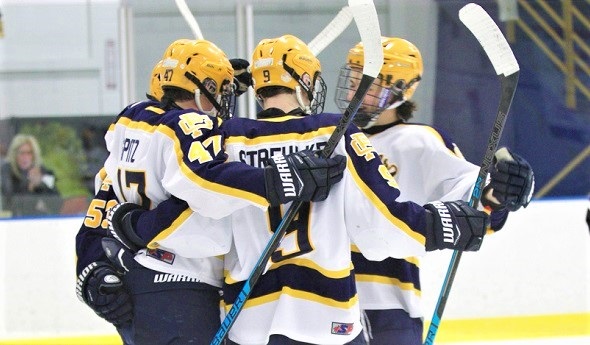
Resurgent GP South Off to Stunning Start
By
Tom Markowski
Special for Second Half
January 23, 2020
It’s been eight years since Grosse Pointe South played for an MHSAA Finals championship in ice hockey.
 But even though we’re just past the halfway point of this season, the Blue Devils have shown they have what it takes to make a trip back to Plymouth for another title shot.
But even though we’re just past the halfway point of this season, the Blue Devils have shown they have what it takes to make a trip back to Plymouth for another title shot.
South is 13-2 and ranked No. 2 in Division 3 in the latest state coaches association poll. To say things have been clicking would be an understatement. Not only have the Blue Devils surprised most in the Metro Detroit area, they’re the surprise team, statewide, in their division.
Take one game recently as a prime example. Detroit Catholic Central is the reigning Division 1 champion and currently ranked No. 1. On Jan. 8, South traveled to Catholic Central’s home arena (USA Hockey Arena, also the home of the MHSAA Finals) and defeated the Shamrocks 4-3.
The result stunned many. Catholic Central entered the game having won its last six by shutout. Less than four minutes into the game South’s David Rivard scored off a pass from Keegan Spitz to end that scoreless streak.
In addition to this incredible win, the Blue Devils received an immeasurable amount of self-confidence.
One contributor who’s playing with supreme confidence is senior goaltender Will Strickler. A two-year starter, he also played as a sophomore – and in fact his first game was against Catholic Central.
“We got shelled, 9-0,” Strickler said. “In the last three years only two teams from Michigan have beaten CC – (Bloomfield Hills) Brother Rice and us. That (victory) made a statement. We’re for real. We also stopped their shutout streak, which was nice.”
Before the start of this season, there likely were few who thought this was possible. Last season South finished 7-18-2, losing to Warren De La Salle Collegiate 3-1 in a Division 3 Pre-Regional. The season before, South finished 9-16 and ended with a loss to Brother Rice 3-1 in a Division 2 Regional Final.
Even though the Blue Devils returned most of their starters this winter, there were concerns. The most obvious question was how this experienced team would play with a new coach.
Paul Moretz took over the program after last season, and this is his 22nd coaching hockey. A graduate of Port Huron High, Moretz started coaching when he was 21, almost immediately after graduating from Western Michigan University. He began with youth hockey in Port Huron before moving on to the Honey Baked Hockey Club and Littles Caesars Amateur Hockey League. He spent the last 10 seasons with Little Caesars, and though this is his first stint coaching high school hockey, he said the timing was right.
“The AAA team I coached was with me all the way up,” Moretz said. “We knew last year would be our last together, so that was going to be it.
“I applied for the South job and, to be honest, I had no clue (how good this team would be). I knew there was potential. I knew it was a good group of young men. I knew there was a group who wanted to work. I didn’t know if that would transform into wins.”
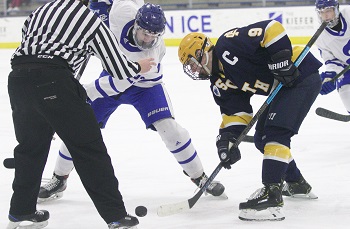 Of the 23 players Moretz has on varsity, 10 are seniors, most playing important roles. It’s common for a team with such success to be senior-dominated – although Moretz added that 13 potential returnees bode well for the team's future.
Of the 23 players Moretz has on varsity, 10 are seniors, most playing important roles. It’s common for a team with such success to be senior-dominated – although Moretz added that 13 potential returnees bode well for the team's future.
Spitz, a forward, leads the team in scoring with 18 goals and 16 assists. Adam Strehlke, who centers the top line, is next with 12 goals and 12 assists. Both are seniors. Next are two juniors, Aaron Vyletel (14 goals, seven assists) and Dean Therriault (eight goals, 13 assists).
South sports four captains, with Strehlke and Therriault joined by Xander Mills and Tommy Daudlin. All are seniors. “Our leaders are our captains,” Moretz said. “Quite frankly, we have a lot of leaders.”
Lacking in size, South plays fast. The Blue Devils chase the puck and attempt to create scoring chances with their forechecking.
South’s lack of physical play may have hurt in its two losses, both to state powerhouse Trenton. Trenton won the first game 3-2 in overtime and the second 2-0, with the second goal coming after South pulled its goalie. But South did send 35 shots on goal the first time, and 34 the next.
“We’re a puck-first team,” Strickler said. “Coach told us that against Trenton to let them make their runs. Just go for the puck. Playing physical hasn’t been a key for us.”
That doesn’t mean there hasn’t been a concerted effort to play more consistently on the defensive end. Last season Bloomfield Hills Cranbrook Kingswood downed South 10-2. This season, in the game immediately following the victory over DCC, South defeated Cranbrook Kingswood, 6-2.
Strehlke points to four reasons for his team’s turnaround. One is Moretz – and, partly because of the new coach, there’s a new attitude.
Strehlke also said players are more committed. And you can’t overlook the experience.
“(Moretz) is part of it,” he said. “But everyone has bought in. We’re playing better defensively. We’re allowing fewer shots. And Will has played well all year.
“You know winning, it’s more fun coming to the rink. Last year it wasn’t fun.”
To Moretz, coaching at this level is no different than it was for him coaching for Little Caesars or elsewhere. For one, he has his longtime assistant Nathan Reilly with him. Moretz allows Reilly the freedom to coach without micromanaging. Another key element, according to Moretz, is having his players pay attention to detail.
“They’re willing to do the little things,” he said. “They trust the game plan, and they execute it very well.”
 Tom Markowski is a correspondent for the State Champs! Sports Network and previously directed its web coverage. He also covered primarily high school sports for the The Detroit News from 1984-2014, focusing on the Detroit area and contributing to statewide coverage of football and basketball. Contact him at [email protected] with story ideas for Oakland, Macomb and Wayne counties.
Tom Markowski is a correspondent for the State Champs! Sports Network and previously directed its web coverage. He also covered primarily high school sports for the The Detroit News from 1984-2014, focusing on the Detroit area and contributing to statewide coverage of football and basketball. Contact him at [email protected] with story ideas for Oakland, Macomb and Wayne counties.
PHOTOS: (Top) Grosse Pointe South players celebrate during a 5-1 win over Riverview Gabriel Richard on Jan. 4. (Middle) Blue Devils senior Adam Strehlke (9) wins a faceoff during a 4-3 victory over Detroit Catholic Central on Jan. 8. (Photos courtesy of Brian McKenna and the Grosse Pointe South hockey program.)
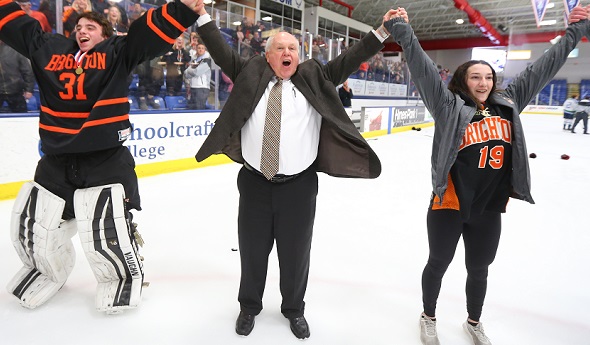
Brighton Coach's Impact 'Immeasurable'
By
Tim Robinson
Special for MHSAA.com
October 7, 2020
By Tim Robinson
Special for Second Half
Paul Moggach has never been much for looking back.
 And as he begins his first season away from the Brighton hockey program in more than three decades, he’s still looking ahead.
And as he begins his first season away from the Brighton hockey program in more than three decades, he’s still looking ahead.
“I’m thinking about what I’m going to miss more than the mark I left,” he said in a phone conversation last week. “I guess I enjoyed so much of the time I had, the opportunity to coach at Brighton, I’m thinking more how I fill the time and the things I'll miss.”
Moggach (pronounced MUG-uth) retired as Brighton’s coach this past summer after 25 seasons and having led five teams to MHSAA Division 1 championships. He compiled a record of 466-172-47 during that period.
But that’s not what he remembers most, nor why he wants people to remember him.
“I would like them to remember the teams and players who played for me and my assistants, more than me,” Moggach said. “We have so many blessings and opportunities in our lives, and hockey was one for me and hopefully for the players and assistants I worked with.”
One of those assistants was Kurt Kivisto, who joined the Bulldogs originally as a team manager more than 20 years ago and was a player at Brighton. He eventually won a national championship at Michigan State before rejoining the program as an assistant coach a decade ago.
“The No. 1 thing I’ll take from him is sticking by your beliefs and not sacrificing those beliefs for the team,” said Kivisto, who was named Moggach’s successor in September. “He sticks by those beliefs and ... he’s not willing to sacrifice that even if it could hurt the team. The character and integrity he has, how he treats people with fairness and what he believes is right is the biggest thing I’ll take.”
A stepson, Damon Whitten, played for Moggach at Brighton and at MSU before becoming an assistant coach and eventually the head coach at Lake Superior State, where he is in his eighth season.
Asked about Moggach’s impact at Brighton, Whitten said, “I’m not sure you can measure it. Your mind goes to the hockey players who have come to Brighton, and that’s a big part. But I think it goes beyond that. The money they’ve raised over the years for different families in need, for example. He’s had a big impact, and the players he had were a big part of that, but it goes well beyond that, and he did it the right way. Thirty-plus years (in the program), and I’m not sure you can count more than a handful of times where he made a bad decision or handled things poorly. He did things the right way, every day, all of the time, and I think it’s why he was so successful for so long.”
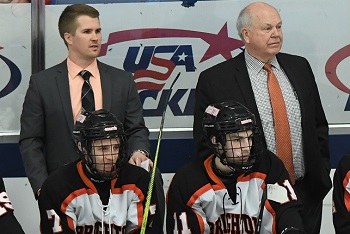 The team’s charitable works were mostly kept under the radar – Moggach’s reasoning being his players had been given much, it was their turn to give back, and he didn’t want people thinking they did those things for publicity.
The team’s charitable works were mostly kept under the radar – Moggach’s reasoning being his players had been given much, it was their turn to give back, and he didn’t want people thinking they did those things for publicity.
Moggach joined Rick Bourbonais as an assistant at Brighton in the mid-1980s, then switched roles with him for the 1996-97 season.
He realized Brighton’s potential in the 1992-93 season, when the Bulldogs upset perennial state power Trenton in the Class A Quarterfinals before losing to Detroit Catholic Central in a Semifinal.
“That, to me, said, at least in my mind, that we can do this,” Moggach said. “It’s not impossible.”
He slowly began to build the program, getting good players and a schedule that would challenge them.
“You get the players by building a good culture,” he said. “Back in the day, when I started, we weren’t very disciplined and our league wasn’t very disciplined. So I think we realized we had to build that, and I could have an influence on building that in Brighton.”
Along with the culture, Moggach looked for an edge whenever he could find it. He was talked into making a trip to the Keweenaw Peninsula by one of his player’s parents, and found enormous benefits for his team, both competitively and in team bonding.
“It’s a lot about the little things we do,” he said, “that we find joy in, and create those opportunities. Creating the little moments really can build to bigger moments. We played capture the flag one day in about two feet of snow.
“Almost killed them,” he added, chuckling. The exhausted players didn’t have much left for the game that night, but spending time together for four days in a bus and hotel room always brought the team closer on and off the ice.
That first UP expedition also led to more teams making the trip, for team bonding and a glimpse of a part of the state, and themselves, they might never have seen otherwise.
“We didn’t do that for long,” he said. “But we always came back saying we were better together because of that experience.”
Bob Nelson had three sons play for Moggach, and Nelson’s wife, Kris, was president of the team’s booster club during their involvement over nearly a decade in Brighton hockey. Nelson also coached the program’s younger players for five seasons.
“We got to know the Moggachs really well,” he said. “It was a good experience, both as a coach and as a parent as well.”
Moggach introduced other things, including an emphasis on nutrition and off-ice training, that players resisted at first until they saw the benefits.
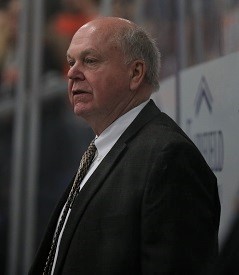 He savored conversations with referees and opposing coaches before the games and even the occasional reporter after games.
He savored conversations with referees and opposing coaches before the games and even the occasional reporter after games.
But his first priority was the players. At times he would erupt in practice at a player or, more commonly, the team, and the boys soon learned to hear the message, not the volume. But for a couple of seasons, they also wrote some of his wilder statements down in a notebook after practice.
One year, they read some of them at the banquet, and after each one, Moggach’s wife, Sharon, would look at him and ask, “Did you really say that?”
Moggach would laugh and confess to remembering he had actually done so, then laughing.
“He knew part of what made the program good was his relationship to the players,” Nelson said. “If it was a good time, he wanted to enjoy it, even at his own expense at times.”
Moggach has staying in the background this offseason, letting Kivisto shape the team.
Asked if he were willing to fully switch coaching roles, as he and Bourbonais did a quarter-century ago, Moggach laughed.
“No,” he said emphatically. “Rick wasn’t in his 70s when we made the switch. Kurt needs his time. I’ll be there if he needs me.”
Moggach, who is 74, still works fulltime as the University of Michigan’s director of risk management.
He plans to spend more time with his wife and watch his grandsons play hockey, as well as catching some Lake Superior State games.
“I was really blessed to have Rick and Brownie (longtime assistant Mike Brown) along for the ride, and then to get Kurt involved,” Moggach said. “They weren’t the only ones, but they were the kids for me.
“The other thing is the support from the Brighton (High School) administration, the teachers, and our community. There are more people to thank than I could ever bring up. I do think that, all together, it was a great run. It couldn’t have been any better.”
PHOTOS: (Top) Recently-retired Brighton hockey coach Paul Moggach celebrates the 2018 Division 1 championship game win over Saginaw Heritage at USA Hockey Arena. (Middle) Former player Kurt Kivisto, left of Moggach during the 2018 Semifinal win over Detroit Catholic Central, served as an assistant before assuming the head coaching job in September. (Below) Brighton's 2018 championship was its fifth under Moggach. (Photos by Hockey Weekly Action Photos.)

